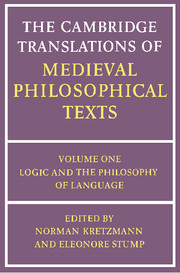Book contents
- Frontmatter
- Contents
- Preface
- General Introduction
- 1 BOETHIUS: On Division
- 2 Anonymous: Abbreviatio Montana
- 3 PETER OF SPAIN Predicables Categories
- 4 LAMBERT OF AUXERRE: Properties of Terms
- 5 Anonymous: Syncategoremata Monacensia
- 6 NICHOLAS OF PARIS: Syncategoremata (selections)
- 7 PETER OF SPAIN: Syllogisms; Topics; Fallacies (selections)
- 8 ROBERT KILWARDBY: The Nature of Logic; Dialectic and Demonstration
- 9 WALTER BURLEY: Consequences
- 10 WILLIAM OCKHAM: Modal Consequences
- 11 ALBERT OF SAXONY: Insolubles
- 12 WALTER BURLEY: Obligations (selections)
- 13 WILLIAM HEYTESBURY: The Compounded and Divided Senses
- 14 WILLIAM HEYTESBURY: The Verbs ‘Know’ and ‘Doubt’
- 15 BOETHIUS OF DACIA: The Sophisma ‘Every Man is of Necessity an Animal’
- Index
13 - WILLIAM HEYTESBURY: The Compounded and Divided Senses
Published online by Cambridge University Press: 05 June 2012
- Frontmatter
- Contents
- Preface
- General Introduction
- 1 BOETHIUS: On Division
- 2 Anonymous: Abbreviatio Montana
- 3 PETER OF SPAIN Predicables Categories
- 4 LAMBERT OF AUXERRE: Properties of Terms
- 5 Anonymous: Syncategoremata Monacensia
- 6 NICHOLAS OF PARIS: Syncategoremata (selections)
- 7 PETER OF SPAIN: Syllogisms; Topics; Fallacies (selections)
- 8 ROBERT KILWARDBY: The Nature of Logic; Dialectic and Demonstration
- 9 WALTER BURLEY: Consequences
- 10 WILLIAM OCKHAM: Modal Consequences
- 11 ALBERT OF SAXONY: Insolubles
- 12 WALTER BURLEY: Obligations (selections)
- 13 WILLIAM HEYTESBURY: The Compounded and Divided Senses
- 14 WILLIAM HEYTESBURY: The Verbs ‘Know’ and ‘Doubt’
- 15 BOETHIUS OF DACIA: The Sophisma ‘Every Man is of Necessity an Animal’
- Index
Summary
Introduction
William Heytesbury was born in Wiltshire, England, around 1313. By 1330 he was a fellow of Merton College, Oxford, with which he is traditionally associated. In 1371 he was Chancellor of the University (he may also have been Chancellor in 1353–54; the records are unclear), and he died in 1372. His works on logic were probably written between 1331 and 1339. The most influential, his Rules for Solving Sophismata, is usually dated 1335. Heytesbury's treatise on the compounded and divided senses of propositions, translated here, seems to have been written before his Rules.
This treatise, De sensu composito et diviso, gets its historical importance not only from the apparent fact that it represents the first attempt to provide a systematic treatment of the various modes in which the distinction between the compounded and divided senses had been recognized by Heytesbury's predecessors, but also from the undoubted fact that it became the sourcebook for much of the subsequent literature on these topics, attracting both imitators and commentators. If the treatise is original in its comprehensiveness, it seems derivative in most other respects; but that hardly counts as a flaw in an attempt to organize scattered, disparately treated material. There are plenty of genuine flaws in the treatise, however, as the attentive reader may discover. But whatever its short-comings, it is and in many respects deserves to be the principal text of a very interesting and suggestive branch of late medieval linguistic analysis.
- Type
- Chapter
- Information
- The Cambridge Translations of Medieval Philosophical Texts , pp. 413 - 434Publisher: Cambridge University PressPrint publication year: 1989
- 1
- Cited by



